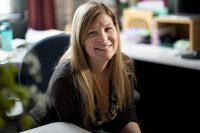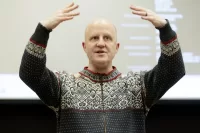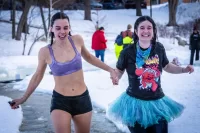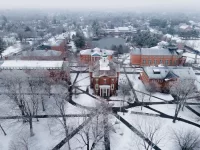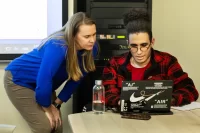
Two Bates professors share the 2020 Ruth M. and Robert H. Kroepsch Award for Excellence in Teaching. Those professors’ students make it easy to see why both received the college’s highest teaching honor.
“He is the professor who has had the single largest impact on the way I view the world,” Morgan Baxter ’20 of Irvine, Calif., says of Joshua Rubin, lecturer in anthropology.
“Jen is exactly what I came to Bates for,” says Cara Starnbach ’19, describing Jennifer Koviach-Côté, associate professor of chemistry and biochemistry.
Koviach-Côté, an expert in carbohydrate chemistry who works on synthesizing molecules related to muscular dystrophy and to fighting a virus that causes illness in infants, has long taught the sequence of organic chemistry courses that most Bates natural science majors take, as well as upper-level courses.
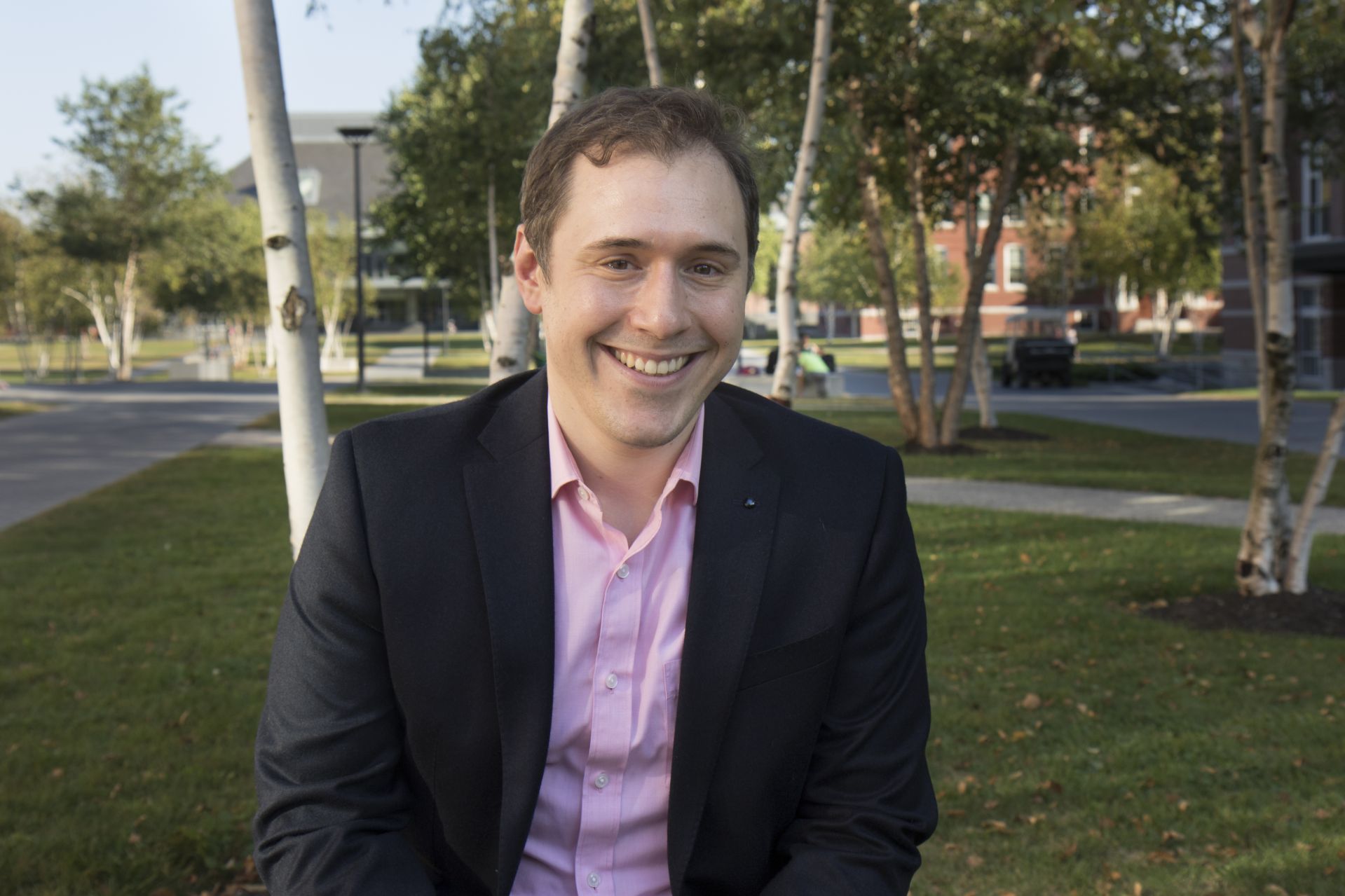
Lecturer in Anthropology Joshua Rubin is a winner of the 2020 Kroepsch Award for Excellence in Teaching. (Samuel Mironko ’21/Bates College)
Rubin studies the often-very-serious effects of sport and play in society: What happens when one person frames an action, perhaps a violent one, as part of a sport, but their opponent does not? What if each has a different political affiliation, and there’s a power imbalance? Rubin teaches courses across the academic levels, including the popular “Art, Power, and Politics.”
Ky Jenkins ’22 of Potomac, Md., is currently taking that class. He says Rubin has a talent for making students question the roles and values they assign to objects and each other, while validating students’ own ideas.
“He’s created a classroom environment where I am not afraid to share my ideas and what I think about the reading or the things he’s saying,” Jenkins says.
Starnbach says that through Koviach-Côté, she developed a strong foundation in chemistry and the confidence to make it her career. She now works at the Dana-Farber Cancer Institute, developing cancer-fighting drugs.
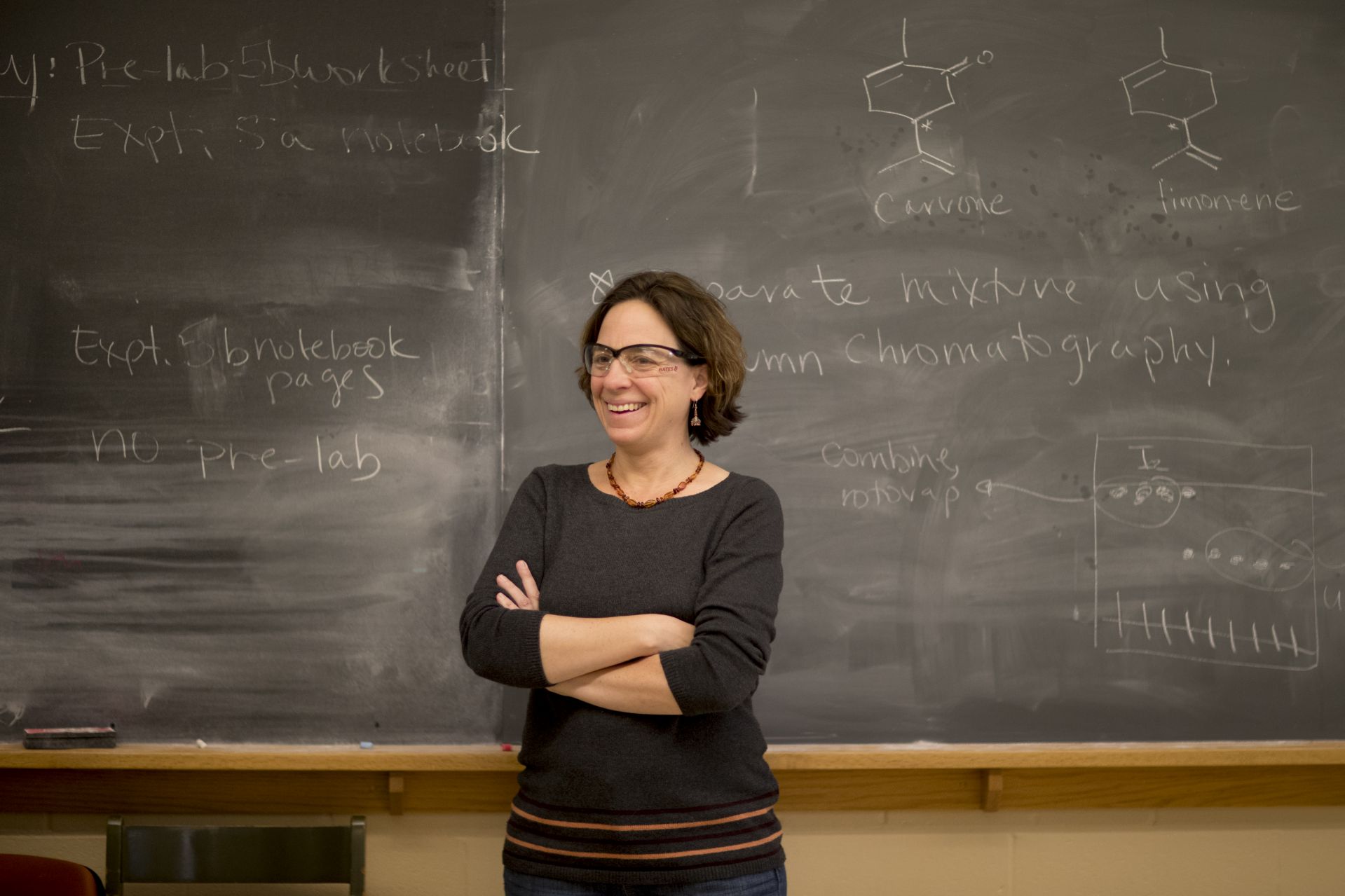
Associate Professor Chemistry and Biochemistry Jennifer Koviach-Côté is a winner of the 2020 Kroepsch Award for Excellence in Teaching. (Phyllis Graber Jensen/Bates College)
Koviach-Côté — who persuaded Starnbach to become a chemistry major — exemplifies the strong teaching that made her experience at Bates exceptional, Starnbach says.
“I’ve seen her give talks and the relationships she has in the field,” she says. “She is respected, and then she takes such pride in teaching undergraduates. She has made it her life’s work to nurture learning at that level and give us good research experiences. I’ve benefited from all of those things.”
We talked with Koviach-Côté and Rubin about their roles as teachers, how they’re making things work remotely, and the most rewarding aspects of teaching at Bates.
What, to you, is teaching? Is it just what happens in the classroom, or is it more than that?
Rubin: Teaching is helping someone to see the world just a little bit differently and providing them with the tools to understand what they’re seeing. It’s about encouraging students to recognize that there are other ways of thinking and other ways of acting in the world beyond the ones they encounter most often.
Teaching is getting students to that realization and then showing them what they can do once they’ve reached it — the possibilities for critique, social action, and emancipation that open up with new perspectives. One lecture won’t do that, nor one discussion.
Koviach-Côté: Teaching is not simply the transfer of information. For me, it involves getting to know students on a personal level — understanding the way they think, understanding the way they approach problems, helping them to think about problems from a different perspective, using a method they may not have thought about before.
Mara Stolzenbach ’20 of Los Angeles talks about her honors thesis adviser, Joshua Rubin, lecturer in anthropology and co-winner of the 2020 Kroepsch Award for Excellence in Teaching.
I often tell students they’re a lot smarter than I am. They argue with me, and I say I know a lot more things, but oftentimes, they are able to pull in information and think about things I wouldn’t have thought about.
Especially with organic chemistry, students are afraid of the topic, and historically chemistry has not done a good job of highlighting research by women and underrepresented minorities. Another goal of mine is to help my students be able to see themselves doing this work and being a part of this topic, and I really try to help students gain confidence in themselves.
What is your teaching style?
Rubin: My teaching style is based on a few things. One is humility. I don’t claim to know everything, I haven’t read everything, and I don’t claim to know how my students experience the world.
The second is confusion. The world is extremely complex — confusion is a sign that you’re venturing into unfamiliar territory and you don’t know quite what to think. The third is personalization. I need to get to know my students and learn how they think. I need them to trust me if we’re going to venture away from comfortable patterns of thought.
Then there’s encouragement. Students are way, way smarter than they think. I see it as my job to take the ideas that students already have, often really great and transformative ideas, and to show them how good they are.
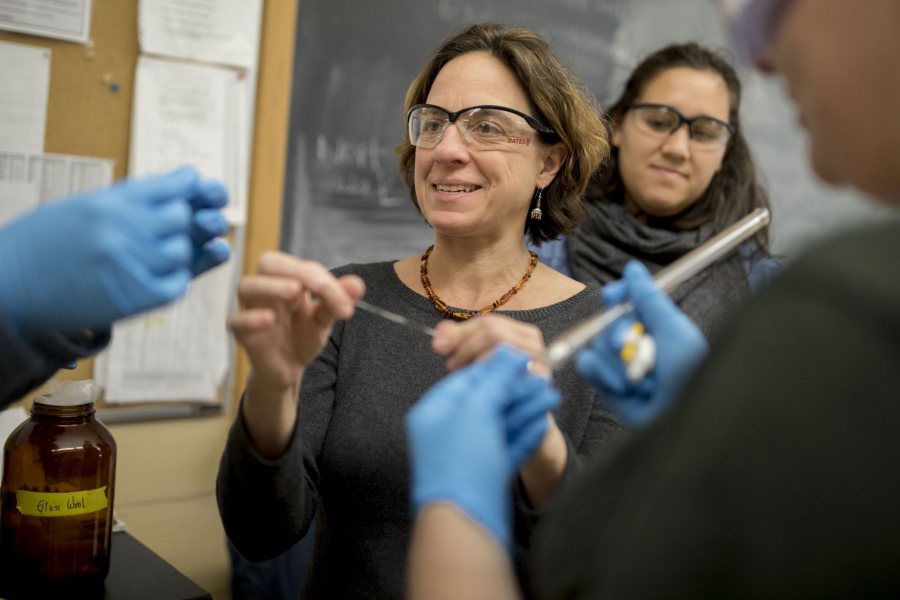
Associate Professor of Chemistry and Biochemistry Jennifer Koviach-Côté displays glass wool in a laboratory for students during a 2018 organic chemistry course. Behind her is teaching assistant Cara Starnbach ’19, who now works at the Dana-Farber Cancer Institute. (Phyllis Graber Jensen/Bates College)
Koviach-Côté: My teaching style is very interactive, very problem-based. I like to use a lot of hands-on exercises. We use a lot of molecular models, especially in the fall semester.
I like to have a personal interaction with students — I’m realizing how important that is, not having it in the last few weeks.
I also like to tie the material into other applications, so students can see this is something that is important in a biological system, or this is something that is used to synthesize an antibiotic, rather than just, “Here’s a reaction.”
I like to get students up at the chalkboard, which goes back to giving students confidence. I like for students to feel like they are in charge of their learning.
What’s been the most rewarding part of teaching at Bates?
Rubin: I’m continually impressed by the willingness of students to join me on intellectual journeys. They will think about things that are tricky, they will read complex material, and they will talk to you and to each other, even if they’re not 100% sure where they stand.
Mitchell Willsey ’20 of Glastonbury, Conn., talks about his honors thesis adviser, Jennifer Koviach-Côté, associate professor of chemistry and biochemistry and co-winner of the 2020 Kroepsch Award for Excellence in Teaching.
There’s a joy in a student getting it, if just for an instant. There’s also the joy of a group of students just riffing off each other, thinking together and going places that I could never have taken them by myself. I find those moments hard to replicate outside of a learning environment, and I really treasure them.
Koviach-Côté: I love it when the same students who come to me on the first day of class to express their anxiety come back six weeks later and say, “I can do this. I can learn this. I did well. I got an A on an exam.”
The other thing I find rewarding is watching these young people grow to become scientists, to see them presenting their research. I love going around the Mount David Summit and seeing students I might not have seen for two years and hearing what they did for their senior thesis.
I also like taking my own students to national meetings and interacting with people in the field, or having students come back three or four years later, finally having found their niche in science, or gotten into medical school. I find it very rewarding to see the accomplishments of my students.
What is it like to work remotely?
Koviach-Côté: Students are amazing. They’re not complaining about things, they’re just taking it in stride, and we’re all doing what we can.
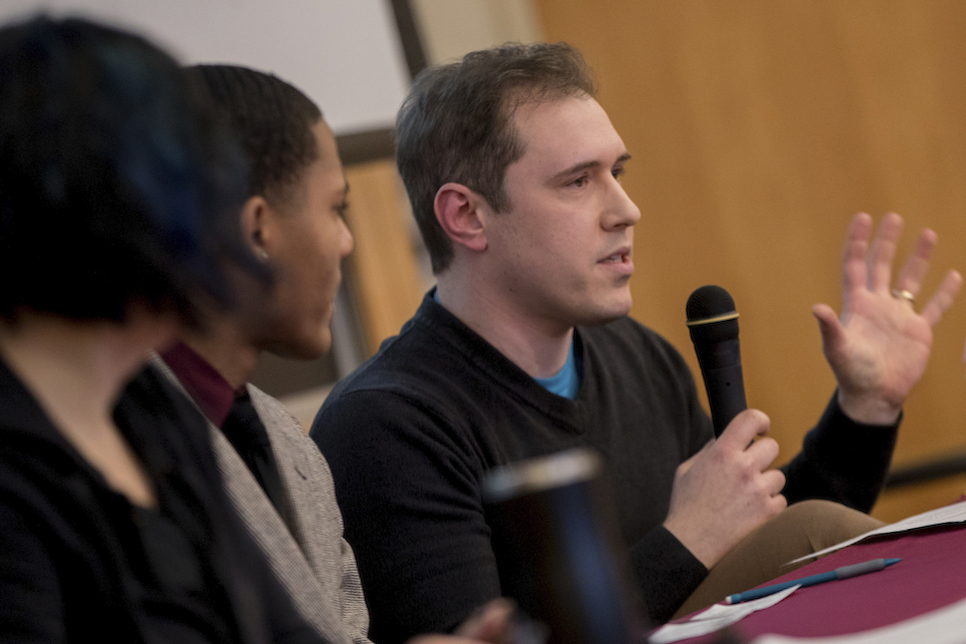
Joshua Rubin speaks at a 2018 Martin Luther King Jr. Day Observance panel on athlete protest. With him is Ellijah McLean ’20 of Providence, R.I., center; and Erica Rand, Whitehouse Professor Art and Visual Culture. (Phyllis Graber Jensen/Bates College)
I’m doing shortened video Zoom lectures with worksheets — “OK, pause the video, do this question, then come back and we’ll go through the answers.” Then I have four hours of Zoom office hours a week and get to see some of them face to face.
We’re hanging in there.
Rubin: One moment of joy that I’ve been experiencing is just how accommodating students have been. Their whole social environment got completely scrambled over the course of a couple of weeks. I’m getting these emails from students that are incredibly thoughtful and kind: “I won’t be able to join our conversation. Is there still some way I can participate?”
“He’s created a classroom environment where I am not afraid to share my ideas and what I think about the reading or the things he’s saying.”
It’s been a real challenge to figure out how to do this technically but also in terms of the material, because for some students other concerns are taking precedence over the readings right now. Others want to talk about how the readings apply to our present moment. I try to make a vibe in a room that can accommodate all these different points of view and respect them.
It’s been really heartwarming and really satisfying to see students try to rise to that challenge.
How do you feel about winning the Kroepsch award?
Koviach-Côté: It sounds trite, but you can’t be a good teacher without good students. I’m grateful to have worked with some outstanding undergraduates. It’s also very humbling — Bates is full of excellent teachers.
Rubin: I feel like there are tons of very talented teachers at this institution so it’s hard for me to feel particularly deserving. To get this kind of recognition at a place like Bates, one that places such value on teaching, is really incredible.
I’m astonished that teaching works. I plan a lesson, students read, they talk to me, I talk to them, and something about how they experience the world is a little bit different, and often the way I experience the world is a little bit different too. The fact that it works at all keeps me fascinated by teaching, and committed to it, and always striving to be a little bit better.

